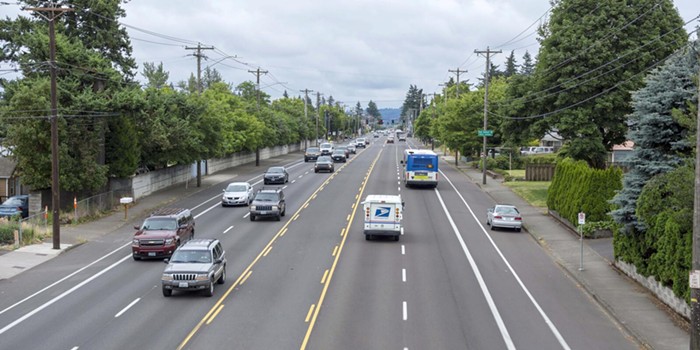City hall's budget wonks play things safe as a rule. So when the City Budget Office (CBO) announced today to expect a couple years of fat ahead of us, expect years of fat, Portland.
And then maybe a return to comparative bleakness.
In a five-year forecast released every December, the CBO says rising property tax revenues, big growth in business profits, and seas of tourists paying high rates for hotel rooms has Portland's financials looking bright.
Just two years after Mayor Charlie Hales thought he was staring down $21 million deficit (a number made far less unwieldy by better-than-expected revenues), Portland next year may have a one-off of $14.4 million more than it needs to pay city expenses, the forecast says. The city also will likely have a smaller but still-significant pool of cash that replenishes each year going forward: about $4.6 million. And remember, this is the cautious prediction.
"We’re coming up with a range and shading things sort of conservatively," says Budget Director Andrew Scott. "We’re in that period of an economic expansion where all the indications tend to fall in one way or the other. Right now they’re falling positively."
The forecast document is a bit stronger: "During periods of robust economic growth, we would expect City revenue to exceed the forecast, sometimes by a significant amount."
This prognosis is good news, obviously, in a city that has slashed services since the Great Recession. It's also—as the Oregonian pointed out at a city council work session about the forecast last month—a bit of a touchy time for good news, since city officials are trying to convince taxpayers to pony up millions each year for long-ignored road maintenance.
Here's the forecast, in broad strokes:

Some reasons for all this unexpected cash:
•Every American's God-Given Right of Land Ownership! Property tax collections are higher than anticipated, and "robust new construction activity will help to add to the property tax rolls for the near future."
•People Love Us!: Portland, right now, is collecting more money than ever before from hotel taxes (known as "transient lodging taxes"). In October and November alone, the city collected more hotel taxes than it did in all of Fiscal Year 2012 (July 2011 to June 2012). That money is largely based in summer tourism, City Economist Josh Harwood says. And it's not so much a function of Portland seeing more tourists than ever before as it is of the city's rising popularity letting hoteliers charge more for rooms. Airbnb also is kicking into this pool, though exactly how much is a secret.
•Commerce! When businesses make money, the city gets a chunk. It can be a volatile figure, for a lot of complicated reasons, but right now business license tax revenues are growing at the strongest clip in years. "Just a year ago collections appeared to be weakening, only to turn around abruptly..." the forecast says.
What all this means is that Portland almost certainly has some comfortable years ahead. But budget wonks also aren't being budget wonks if they don't point to possible fiscal clouds on the horizon.
Right now, the city's experienced years of growth, Scott notes. It simply can't sustain that forever.
"We’re five years into an expansion," he says. "That’s the average post-World War II expansion length. The odds of a downturn at some time in the five year forecast are high."
The CBO also sees threats to this newfound stability. If a lawsuit challenging reforms to public employee pensions is successful, we'd be out a lot of money, the forecast notes. And there are big projects that need to be paid for, like the Willamette River superfund cleanup, and the Portland Building's rehab or demolition.
Which has Scott and Harwood, like the prudent, fiscally conservative budget stewards they are, attaching a caution to this news: Look to maintenance, and not flashy new toys.
"This is good news—certainly better than taking a cut," Scott says. "But $4.6 million ongoing is not a huge amount of money. We need to be making investments right now that make it easier in the downturn."


















